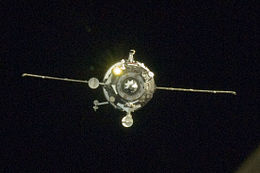 Progress M-17M approaches the aft docking port of the Zvezda Module. | |
| Mission type | ISS resupply |
|---|---|
| Operator | Roskosmos |
| COSPAR ID | 2012-060A |
| SATCAT no. | 38975 |
| Mission duration | 192 days |
| Spacecraft properties | |
| Spacecraft type | Progress-M s/n 417 |
| Manufacturer | RKK Energia |
| Launch mass | 6950 kg |
| Start of mission | |
| Launch date | 31 October 2012, 07:41:19 UTC |
| Rocket | Soyuz-U |
| Launch site | Baikonur, Site 1/5 |
| End of mission | |
| Disposal | Deorbited |
| Decay date | 21 April 2013, 15:02:00 UTC |
| Orbital parameters | |
| Reference system | Geocentric |
| Regime | Low Earth |
| Perigee altitude | 193.0 km |
| Apogee altitude | 245.0 km |
| Inclination | 51.66° |
| Period | 88.58 minutes |
| Epoch | 31 October 2012 |
| Docking with ISS | |
| Docking port | Zvezda |
| Docking date | 31 October 2012, 13:40:00 UTC |
| Undocking date | 15 April 2013, 12:02 UTC |
| Time docked | 166 days |
| Cargo | |
| Mass | 2397 kg |
| Pressurised | 1247 kg (dry cargo) |
| Fuel | 683 kg |
| Gaseous | 47 kg (oxygen and air) |
| Water | 420 kg |
Progress ISS Resupply | |
Progress M-17M (Russian: Прогресс М-17М), identified by NASA as Progress 49P, was a Progress spacecraft used by Roskosmos to resupply the International Space Station during 2012. The seventeenth Progress-M 11F615A60 spacecraft to launch, it had the serial number 417 and was built by RKK Energia. It was the 130th launch to the ISS and the twentieth Russian space launch in 2012. It was also the eleventh mission for the R-7 family of rockets since the beginning of the year.
On 15 April 2013, Progress M-17M cargo ship undocked from the Space Station. It was disposed six days later and fell into the Pacific Ocean on 21 April 2013.[1]
- ^ NASA (15 April 2013). "Crew Preps for Spacewalk; Cargo Ship Departs". NASA. Retrieved 2 May 2013.
 This article incorporates text from this source, which is in the public domain.
This article incorporates text from this source, which is in the public domain.